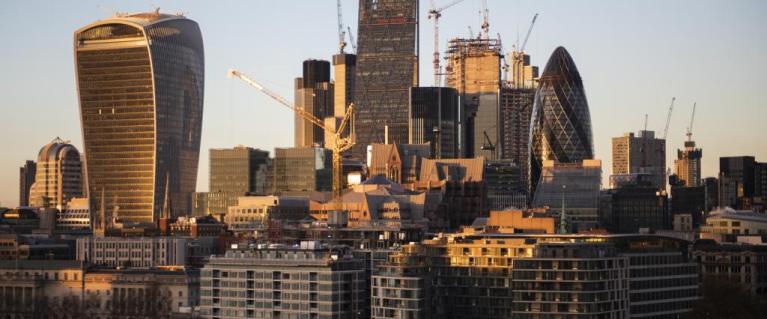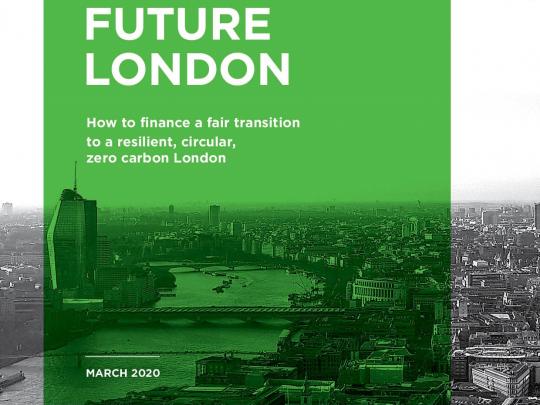
Our green finance work
How can we unlock the investment needed to deliver environmental activity at scale in London? How can we ensure that projects are available in the right format and at sufficient scale to attract this investment? These are some of the questions being addressed by the LSDC’s ‘Green Finance’ work.
Background
In his 2018 London Environment Strategy, the Mayor set out an ambition for the capital to be zero carbon by 2050, and for the city to transition to a low carbon circular economy.
Mobilising the public sector funding and private finance to deliver the scale and speed of activity required to meet this aim, and to achieve the Mayor’s wider environmental ambitions, is an important challenge highlighted in the London Environment Strategy and for achieving a sustainable world city.
Recognising this challenge, the LSDC has also identified green finance as a key part of its work programme. The LSDC has been working closely with the GLA and others to identify and promote the actions needed to create demand for low carbon projects and options to finance these and wider environmental programmes in the capital, such as flood risk management, green sustainable urban drainage (SuDS) and green infrastructure improvements.
What the LSDC is doing
The LSDC has over the past few months held a series of exploratory roundtables with those involved in delivering and securing investment for programmes covering energy efficiency, low carbon heat and energy, flood risk management and green infrastructure. This has helped uncover some of the key challenges related to funding and financing programmes, and to the delivery at the scale required to create a zero-carbon, sustainable city.
The results of this research are now published in the LSDC's report Financing for a Future London.

Download the Executive Summary here
Huge flows of global capital pass through the square mile every day - but London itself often misses out. Such green finance flows as are issuing from the City are largely contributing to decarbonising other metropolises across the world rather than our own. This is perverse and will lead to London conceding a global leadership role unless reversed.
The LSDC believes there is an opportunity to invest taxpayers money effectively to increase the scale and quality of green finance in London, and in doing so leverage much larger private capital flows - but only if London is given the devolved financial capacity to do so.
We also believe that this can be done in a manner that brings real social as well as environmental benefits.
There must be a redoubling of London's efforts to avoid the societal collapse facing humanity unless the twin threats of global heating beyond 1.50 C and human-driven ecosystem collapse are averted. In Financing for a Future London, the LSDC calls for the establishment of a taskforce comprised of key stakeholders including public and private sector representatives to determine how a London Future Finance Facility (LFFF) could be established.
The LFFF would need significant devolved powers from Government in order to deliver the investment London needs to decarbonise, thrive and be resilient in a climate changing world. Uniquely it will have a focus on delivering a just transition supporting disadvantaged communities and creating jobs.
It is proposed that the LFFF would have four central objectives:
- Securing a flow of investment that responds to the needs of environmental projects by the mid-2020's which is of sufficient scale and nature to meet the needs of London's decarbonisation projects and ultimately London's revised 1.50C trajectory.
- Ensuring all parts and communities of London enjoy the benefit of its activities as a driver of 'inclusive growth' and as part of the delivery of the transition to a low carbon circular economy.
- Supporting London to become the global centre for the low carbon circular economy.
- Demonstrating the efficiency, effectiveness and social value of integrated climate and environmental financing, helping this approach to investing in multi-issue projects at an area level to become the new normal.
The report claims the changes needed to ensure the finance is available for the capital to hit its zero carbon target by 2050 are so profound that only an organisation such as the LFFF will make this a reality.
Building on City Hall's existing work on green finance including the Mayor's Energy Efficiency Fund, the LFFF will aim to act as a bridge between boroughs and major investors, identifying infrastructure needs and a pipeline of low-carbon, commercially investible opportunities.
If you are interested in getting involved in this work, or hearing more about it, please get in touch.
Need a document on this page in an accessible format?
If you use assistive technology (such as a screen reader) and need a version of a PDF or other document on this page in a more accessible format, please get in touch via our online form and tell us which format you need.
It will also help us if you tell us which assistive technology you use. We’ll consider your request and get back to you in 5 working days.